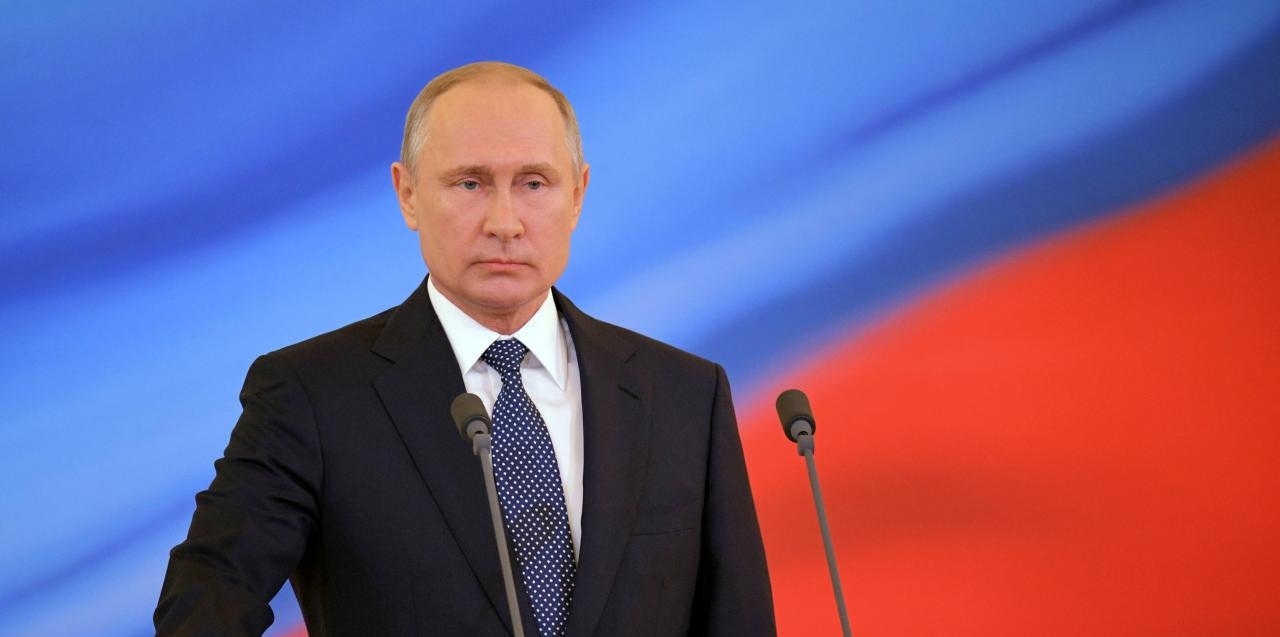Putin begins 4th term
May 7, 2018 | Expert Insights

Russian President Vladimir Putin was inaugurated into his 4th term in office on 7th May. Putin won the presidential elections earlier this year with a landslide 75% majority. His six-year term will end in 2024.
Background
Russian President Vladimir Putin was born in 1952 in Leningrad (now St. Petersburg). He was an active member of the KGB for 16 years. Putin entered politics in 1991, and was named acting Prime Minister in 1999. He won the Presidential elections in 2000 and has remained in power since. He circumvented the constitutional term limit by serving a 4-year term as Prime Minister from 2008-2012. Putin has been criticized as an autocrat. International observers have noted that the country has seen increased corruption and declining democracy under Putin’s rule. A number of his most vocal critics died under suspicious circumstances, and he has been accused of human rights violations.
Putin’s first two terms in power saw an average annual growth rate of 7%, buoyed by healthy oil and gas prices. However, the Russian economy was hit by recession after the 2008 financial crisis, followed by a plunge in oil prices. After Russia intervened in Ukraine in 2014 and annexed Crimea, the West imposed numerous sanctions on Moscow. The World Bank has estimated that the Russian GDP will have a “modest growth” of 1.7% in 2018, higher than estimates for previous years.
Despite declining economic performance, Putin has enjoyed relatively high approval ratings throughout his career. In a state of the nation address earlier this year, Putin promised to address issues such as pensions, poverty, education, healthcare, infrastructure, and economic reform during his next term as President. Besides addressing domestic issues, Putin upped military rhetoric, claiming that the nation had developed an arsenal of nuclear weapons that are invincible and can pierce through US defences.
Under Putin, Russia’s ties with the West have deteriorated, beginning with the annexation of Crimea. Russia stands accused of cyber-attacks and election interference in the 2016 US presidential elections. The poisoning of the former Russian spy Sergei Skripal added to the suspicion and diplomatic tensions. Moscow and Washington have clashed over Syria, leading to fears of another war. Earlier this year, Western-led forces carried out missile strikes against Russia-backed Assad, despite Russian warnings of retaliation.
Analysis
Russian President Vladimir Putin was sworn in on 7th May. Putin won the Presidential elections in a landslide victory with 75.9% of the vote in March this year. Putin is due to appoint a new cabinet after his inauguration. During his inauguration speech, Putin said that Russia had risen from its setbacks “like a phoenix”. "We need breakthroughs in all areas of life. I'm deeply convinced that such a leap forward can only be secured with a free society that accepts all that is new and advanced," he said.
The inauguration was preceded by protests in at least 19 cities. Over 1,000 arrests were made across the country. Opposition leader Alexei Navalny, an anti-corruption activist who was barred from standing against Putin, was also briefly arrested. Navalny and other domestic critics have claimed that Putin runs a “managed democracy”, and prevents genuine democratic processes. During Putin’s 2012 inauguration, tens of thousands of protestors clashed with the police, and 400 were arrested.
Analysts believe that continuity will be the primary feature of Putin’s next term, particularly in terms of the authoritarian nature of his rule. However, according to some commentators, the Russian President has considered mending ties with the West, as sanctions have impacted the Russian economy. The most recent sanctions by the US on April 6th, targeted a number of Russian oligarchs, officials, and companies. Sanctions have resulted in a technological lag, and have hindered the growth of the economy despite a rise in oil prices.
Putin is reportedly considering appointing former finance minister Alexei Kudrin to lead an economic outreach strategy aimed at the West. Kudrin has advocated for structural reforms to the political and judicial system, and analysts have said that his appointment could signal a shift in Russian foreign policy. Herman Graf, former Minister of Economics and Trade, and Elvira Nabiullina, head of the Central Bank of Russia, are others in the pro-Western camp. However, it has been noted that there are other officials amongst Putin’s advisors who could act as a counter to Kudrin. Among these is economic advisor Sergey Glazyev. “Even if Kudrin joins the government, he won’t be able to do much given the current political framework,” said Carnegie Moscow Center analyst Andrei Kolesnikov.
While Moscow may not want to invite further sanctions, it may also not be likely to concede to Western demands. “For Putin any concession is a sign of weakness, so there shouldn’t be any expectation of a change in foreign policy,” said Political Expert Group head Konstantin Kalachev. “Also, foreign policies are one of the main foundations of his support within the country. Putin needs to guarantee national unity, and for this he needs an enemy.”
Assessment
Our assessment is that while President Putin faces several domestic challenges including burgeoning opposition, he has continued to hold public sentiment. We believe that Putin’s foreign policy may remain unchanged in the short term. However, economic stagnation and sanctions are issues that the President may soon need to address. A political solution to the Syrian conflict could allow Russia to withdraw its troops and focus on domestic issues. As stated previously, it is uncertain how long Putin intends to rule.








Comments